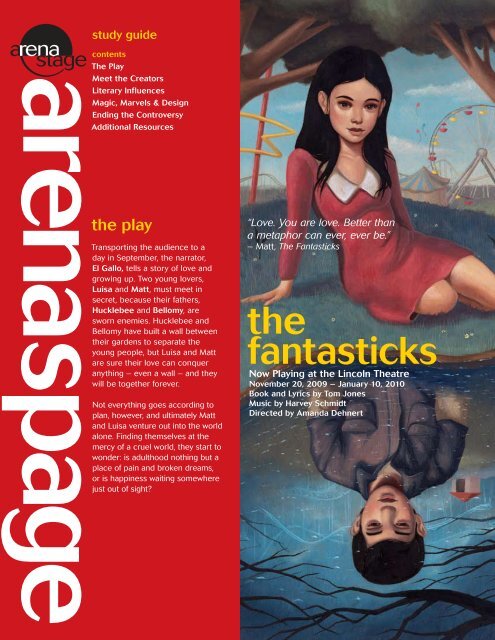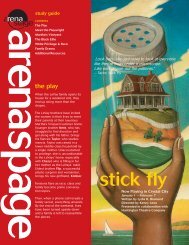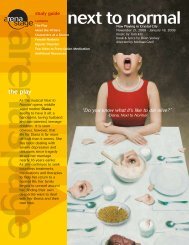the fantasticks - Arena Stage
the fantasticks - Arena Stage
the fantasticks - Arena Stage
You also want an ePaper? Increase the reach of your titles
YUMPU automatically turns print PDFs into web optimized ePapers that Google loves.
study guide<br />
contents<br />
The Play<br />
Meet <strong>the</strong> Creators<br />
Literary Influences<br />
Magic, Marvels & Design<br />
Ending <strong>the</strong> Controversy<br />
Additional Resources<br />
<strong>the</strong> play<br />
Transporting <strong>the</strong> audience to a<br />
day in September, <strong>the</strong> narrator,<br />
El Gallo, tells a story of love and<br />
growing up. Two young lovers,<br />
Luisa and Matt, must meet in<br />
secret, because <strong>the</strong>ir fa<strong>the</strong>rs,<br />
Hucklebee and Bellomy, are<br />
sworn enemies. Hucklebee and<br />
Bellomy have built a wall between<br />
<strong>the</strong>ir gardens to separate <strong>the</strong><br />
young people, but Luisa and Matt<br />
are sure <strong>the</strong>ir love can conquer<br />
anything – even a wall – and <strong>the</strong>y<br />
will be toge<strong>the</strong>r forever.<br />
Not everything goes according to<br />
plan, however, and ultimately Matt<br />
and Luisa venture out into <strong>the</strong> world<br />
alone. Finding <strong>the</strong>mselves at <strong>the</strong><br />
mercy of a cruel world, <strong>the</strong>y start to<br />
wonder: is adulthood nothing but a<br />
place of pain and broken dreams,<br />
or is happiness waiting somewhere<br />
just out of sight?<br />
“Love. You are love. Better than<br />
a metaphor can ever, ever be.”<br />
– Matt, The Fantasticks<br />
<strong>the</strong><br />
<strong>fantasticks</strong><br />
Now Playing at <strong>the</strong> Lincoln Theatre<br />
November 20, 2009 – January 10, 2010<br />
Book and Lyrics by Tom Jones<br />
Music by Harvey Schmidt<br />
Directed by Amanda Dehnert
meet <strong>the</strong><br />
creators<br />
Tom Jones<br />
& Harvey Schmidt<br />
“This is <strong>the</strong> wall <strong>the</strong>ir fa<strong>the</strong>rs built between <strong>the</strong>ir houses.”<br />
– El Gallo, The Fantasticks<br />
Literary<br />
Influences<br />
When Jones and Schmidt wrote The Fantasticks,<br />
<strong>the</strong>y drew inspiration from <strong>the</strong> work of two<br />
earlier playwrights, Edmond Rostand and<br />
William Shakespeare.<br />
William Shakespeare<br />
Tom Jones and Harvey Schmidt<br />
met at <strong>the</strong> University of Texas<br />
while working on <strong>the</strong> musical<br />
revue Hipsy-Boo! They started<br />
writing songs toge<strong>the</strong>r, even<br />
exchanging lyrics and musical<br />
tapes during <strong>the</strong>ir active duty<br />
in <strong>the</strong> Korean War. Jones<br />
generally wrote <strong>the</strong> words, and<br />
Schmidt composed <strong>the</strong> music.<br />
After <strong>the</strong> war, <strong>the</strong>y moved to<br />
New York City.<br />
In 1959, a friend approached<br />
<strong>the</strong>m about writing a one-act<br />
musical for a college <strong>the</strong>ater<br />
festival. They completed The<br />
Fantasticks in three weeks.<br />
After a summer at Barnard<br />
College, <strong>the</strong>y moved <strong>the</strong> show<br />
Off-Broadway to <strong>the</strong> Sullivan<br />
Street Playhouse, where<br />
it ran for a record 17,162<br />
performances before closing in<br />
January 2002.<br />
Jones and Schmidt continued<br />
to work toge<strong>the</strong>r on musicals,<br />
including 110 in <strong>the</strong> Shade and<br />
I Do! I Do! In <strong>the</strong> late 1990s,<br />
<strong>the</strong>y appeared as actors in an<br />
Off-Broadway musical revue of<br />
<strong>the</strong>ir work entitled The Show<br />
Goes On. Then in 2006, Jones<br />
and Schmidt celebrated <strong>the</strong><br />
opening of <strong>the</strong> Off-Broadway<br />
revival of The Fantasticks.<br />
Romeo and Juliet, <strong>the</strong> most famous tragedy of English<br />
playwright William Shakespeare (1564-1616), is about a<br />
young couple whose families are embroiled in a bitter<br />
feud. Their love is cut short as a series of tragic events<br />
leads to <strong>the</strong>ir deaths.<br />
Edmond Rostand<br />
Inspired by Shakespeare’s tale of star-crossed (cursed)<br />
lovers, French playwright Edmond Rostand (1868-1918)<br />
decided to write a ligh<strong>the</strong>arted version of <strong>the</strong> play. In Les<br />
Romanesques, two children from feuding families fall in<br />
love, but not all things are as <strong>the</strong>y seem.<br />
Jones and Schmidt also drew inspiration from Shakespeare’s<br />
comedy A Midsummer Night’s Dream. In one of its subplots, an<br />
amateur acting troupe puts on a play called Pyramus and Thisbe,<br />
in which two lovers speak to each o<strong>the</strong>r through a crack in a wall.<br />
Just as in The Fantasticks, <strong>the</strong> wall is portrayed in minimal fashion<br />
by an actor miming <strong>the</strong> dividing structure. l<br />
Activity! Read and perform Pyramus and Thisbe, <strong>the</strong> humorous, over-<strong>the</strong>top<br />
play presented by <strong>the</strong> acting troupe in A Midsummer Night’s Dream.<br />
You’ll find it in Act V, Scene i. In what ways does this play remind you of<br />
Luisa and Matt’s courtship in The Fantasticks?<br />
“Now, let me tell you a few things you may want to know<br />
before we begin <strong>the</strong> play.” – El Gallo, The Fantasticks<br />
The Fourth Wall<br />
When <strong>the</strong> actors in The Fantasticks speak directly to <strong>the</strong> audience, <strong>the</strong>y<br />
are doing what’s called “breaking <strong>the</strong> fourth wall.” This “wall” is <strong>the</strong><br />
divide between actor and audience. Imagine <strong>the</strong> stage space as a box.<br />
Now, envision a clear “wall” that stretches from <strong>the</strong> front edge of <strong>the</strong><br />
stage up to <strong>the</strong> ceiling to complete <strong>the</strong> box: this is <strong>the</strong> fourth wall. When actors<br />
address <strong>the</strong> audience, <strong>the</strong>reby acknowledging a world beyond <strong>the</strong> one in <strong>the</strong>ir play,<br />
<strong>the</strong>y break through this wall. l
A Record-<br />
Setting<br />
Show<br />
At <strong>the</strong> close of <strong>the</strong> Barnard<br />
College production, a<br />
producer commissioned<br />
Jones and Schmidt to turn The<br />
Fantasticks into a full-length musical,<br />
and on May 3, 1960, it opened Off-<br />
Broadway in Greenwich Village.<br />
Despite some early mixed reviews,<br />
<strong>the</strong> show enjoyed packed houses. The<br />
Fantasticks became wildly popular with<br />
audience members, many of whom<br />
came back multiple times.<br />
Magic,<br />
Marvels<br />
& Design<br />
The magical innocence<br />
of early amusement<br />
parks and <strong>the</strong>ir<br />
more unsettling<br />
counterparts – sideshows<br />
– inspired <strong>the</strong> design of this<br />
production of The Fantasticks.<br />
The original sign (legally obtained!) from <strong>the</strong><br />
abandoned Rocky Point Amusement Park in Rhode<br />
Island adds au<strong>the</strong>nticity to <strong>the</strong> set, though <strong>the</strong> play is<br />
not set in any particular park. Set Designer Eugene Lee<br />
When <strong>the</strong> producer announced in<br />
1986 that <strong>the</strong> show was closing, he<br />
encountered serious resistance from<br />
<strong>the</strong> public and those involved in <strong>the</strong><br />
production. In <strong>the</strong> end, he relented, and<br />
<strong>the</strong> show continued until its final show<br />
on January 13, 2002.<br />
Its 17,162 performances at <strong>the</strong> Sullivan<br />
Street Playhouse earned The Fantasticks<br />
<strong>the</strong> title of world’s longest-running<br />
musical, and <strong>the</strong> show continues to<br />
dazzle audiences today, both in New<br />
York and around <strong>the</strong> world. l<br />
The director, Amanda<br />
Dehnert, and designers used<br />
<strong>the</strong>ir research into <strong>the</strong>se<br />
bygone places to create<br />
<strong>the</strong> sets, costumes, lighting,<br />
sound and direction of <strong>the</strong><br />
play. The result is not a<br />
realistic representation of a<br />
park. Instead, says Dehnert,<br />
it evokes <strong>the</strong> atmosphere of<br />
a place people once went<br />
to escape <strong>the</strong>ir cares, which<br />
is now full of <strong>the</strong> ghosts of<br />
happiness and joy. It is a<br />
place where “magic makes<br />
<strong>the</strong> impossible seem possible<br />
even for a moment” and a<br />
world where things do not<br />
always turn out <strong>the</strong> way we<br />
expect. l<br />
El Gallo’s coat is made with<br />
illustrations from sideshow<br />
posters. Costume Designer<br />
Jessica Ford<br />
Sullivan Street<br />
Playhouse, <strong>the</strong><br />
long-time home<br />
of The Fantasticks<br />
Activity Musicals such as A<br />
Chorus Line, Cats, and The<br />
Phantom of <strong>the</strong> Opera are<br />
known for <strong>the</strong>ir long runs on<br />
Broadway. Create a graph charting<br />
Broadway’s most successful shows in<br />
terms of total performances. How do<br />
<strong>the</strong>y compare to this Off-Broadway<br />
musical? What do <strong>the</strong>se plays have in<br />
common with The Fantasticks?<br />
Consider genre, cast size, spectacle,<br />
star power, etc.
Helpful Hints for Theater Audiences<br />
“Why invite regret, when you can order<br />
an abduction you will never forget!”<br />
– El Gallo, The Fantasticks<br />
Ending <strong>the</strong><br />
Controversy<br />
rape: to seize and take away by force, from <strong>the</strong> Latin rapere<br />
In <strong>the</strong> original version of “It Depends on What You Pay,” El Gallo uses <strong>the</strong><br />
word “rape” — not “abduction” — to describe his kidnapping schemes. To<br />
avoid confusion, he explains his use of <strong>the</strong> word, citing its Latin roots and its<br />
presence in classical works, such as Alexander Pope’s The Rape of <strong>the</strong> Lock,<br />
in which a woman’s lock of hair is stolen.<br />
Today, however, <strong>the</strong> word “rape” instead brings to mind a violent crime. Not<br />
wishing to confuse audience members or appear insensitive to violence against<br />
women, Jones and Schmidt rewrote <strong>the</strong> song several years ago. In every line but<br />
one, <strong>the</strong>y replaced <strong>the</strong> word “rape” with “abduction.” In that one instance, <strong>the</strong>y<br />
left it in solely to preserve <strong>the</strong> rhythm. l<br />
Activity Listen to lyricist Tom Jones explain <strong>the</strong> changes to “It Depends<br />
on What You Pay” on NPR’s All Things Considered. Find <strong>the</strong> interview at<br />
www.npr.org/templates/story/story.php?storyId=5697901.<br />
As an audience member at <strong>the</strong> <strong>the</strong>ater,<br />
YOU are part of <strong>the</strong> show! Just as you<br />
see and hear <strong>the</strong> actors onstage, <strong>the</strong>y<br />
can see and hear you in <strong>the</strong> audience.<br />
To help <strong>the</strong> performers do <strong>the</strong>ir best,<br />
please remember <strong>the</strong> following:<br />
Arrive at least 30 minutes early.<br />
Visit <strong>the</strong> restroom before <strong>the</strong> show starts.<br />
Before <strong>the</strong> show begins, turn off your<br />
cell phone, watch alarms, pagers,<br />
and o<strong>the</strong>r electronic devices. If<br />
anything rings by accident, shut it off<br />
immediately.<br />
Save food and drinks for <strong>the</strong> lobby.<br />
There is no eating or drinking inside<br />
<strong>the</strong> <strong>the</strong>ater.<br />
Walk to and from your seat - no<br />
running in <strong>the</strong> <strong>the</strong>ater!<br />
Do not talk, whisper, sing, or hum.<br />
Do not use cell phones for calls, text<br />
messages, pictures or games.<br />
Keep your feet on <strong>the</strong> floor, not on <strong>the</strong><br />
seat in front of you.<br />
Avoid getting up during a show<br />
because it distracts your neighbors<br />
and <strong>the</strong> performers. If you must leave,<br />
wait for a scene change, <strong>the</strong>n exit<br />
quietly and quickly.<br />
Performers appreciate enthusiastic<br />
applause ra<strong>the</strong>r than whistling or<br />
shouting.<br />
Cameras and videotape are<br />
prohibited because <strong>the</strong>y are<br />
distracting to <strong>the</strong> performers.<br />
Enjoy <strong>the</strong> show!<br />
Additional Resources<br />
Books/Plays:<br />
A Midsummer Night’s Dream by William Shakespeare<br />
Cyrano de Bergerac by Edmond Rostand<br />
Romeo and Juliet by William Shakespeare<br />
Masks, Mimes and Miracles by Allardyce Nicoll<br />
The Amazing Story of <strong>the</strong> Fantasticks: America’s Longest-Running Play<br />
by Donald C. Farber & Robert Viagas<br />
On <strong>the</strong> Web:<br />
The Fantasticks Official Website: www.<strong>the</strong><strong>fantasticks</strong>.com<br />
On DVD:<br />
The Fantasticks, Rated PG, 1995<br />
Sub/Text<br />
For links and research related to <strong>Arena</strong> <strong>Stage</strong> productions, compiled by <strong>Arena</strong> <strong>Stage</strong><br />
dramaturgs, please visit Sub/Text: Your Virtual Dramaturg at<br />
www.arenastage.org/season/08-09/sub-text/.<br />
dramaturg– a <strong>the</strong>ater specialist who does research for<br />
productions and represents <strong>the</strong> intentions of <strong>the</strong> playwright<br />
1101 Sixth Street, SW<br />
Washington, DC 20024<br />
Phone: (202) 554-9066<br />
Fax: (202) 488-4056<br />
Community Engagement<br />
Phone: (202) 234-5782<br />
Fax: (202) 797-1043<br />
Written by Sarah Yount<br />
Edited by Rebecca Campana<br />
illustration by Anna Bagayan<br />
Visit www.arenastage.org<br />
for more information on<br />
<strong>Arena</strong> <strong>Stage</strong> productions<br />
and educational opportunities.




